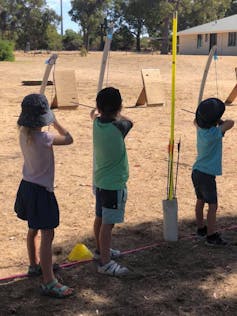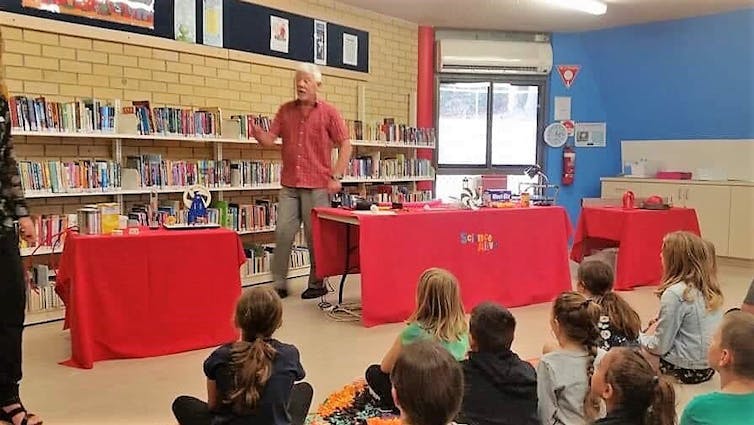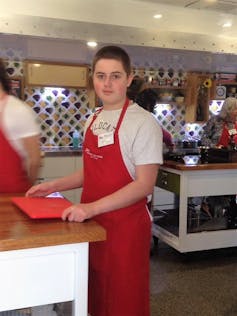Homeschooled children are far more socially engaged than you might think
- Written by Kate Burton, Adjunct Lecturer in Education, Edith Cowan University
This article is part of our series on homeschooling in Australia. The series answers common questions including why homeschooling is on the rise and how outcomes of homeschooled children compare with those who attend formal schooling.
Between 2011 and 2017, the number of children homeschooled in Australia grew by more than 80%. In Queensland, it nearly quadrupled during this period. This suggests one in 200 Australian students were home educated in 2017.
Some people believe homeschooled children miss out on socialising with others and are sheltered from the normal pressures of life. Many question how parents can cultivate important aspects of social development such as resilience and effective interpersonal skills in their children if they are not being exposed to peers in a typical school setting.
The “socialisation question”, as it is known in homeschooling research, is frequently encountered by homeschooling families.
We conducted a survey that captured data on various aspects of the homeschooling experience, including socialisation. A total of 385 parents or guardians from across all Australian states and territories, who were homeschooling 676 children, responded to the questionnaire. We then conducted interviews with 12 homeschooling parents/guardians.
 Homeschooled children learning archery.
Author provided
Homeschooled children learning archery.
Author provided
Our yet-to-be-published survey found homeschooled children have ample opportunities for engagement and socialisation. This includes being involved in various learning and other community groups, and participating in homeschooling co-ops.
The socialisation question
Homeschooling families don’t conform to social norms by virtue of not attending formalised schooling. When people deviate from mainstream expectations, it can provoke strong opinions from other members of society.
Concerns about socialisation are persistent despite a number of research papers that found homeschooled children are not denied opportunities to socialise. As one paper’s authors noted:
Whilst home education does occur from a ‘home base’ many home education approaches extend learning well beyond the bounds of the family home by way of experiential learning and accessing community resources.
A study of 70 US home-schooled children concluded that “homeschooled children’s social skills scores were consistently higher than those of public school students”.
And another study’s author wrote:
Compared to children attending conventional schools, research also suggests homeschooled children often have higher quality friendships and better relationships with their parents and other adults.
Similarly, a 2014 parliamentary review of homeschooling in New South Wales found no concerns in relation to the socialisation of homeschooled children and no recommendations in this area were deemed to be necessary.
An active homeschooling community
Our survey and interviews demonstrated homeschooled children were active members of their community, and were far more socially engaged than public misconceptions suggest.
Read more: How parents can help their young children develop healthy social skills
Nearly 50% of children participated in at least one club activity. This included 24 different sports – from AFL to aerial silks and yoga – and clubs including lego and chess. Around 40% attended at least one regular learning group. Classes included new languages, gardening, Shakespeare and archaeology.
 Homeschooled children regularly attend community events and are involved in learning groups, such as this science group at a local library.
Author provided
Homeschooled children regularly attend community events and are involved in learning groups, such as this science group at a local library.
Author provided
The majority of research participants regularly had “play dates” with homeschooling and/or non-homeschooling families. Children actively participated in their community through the arts, including community theatre, bands, choirs, dance and visual arts classes.
More than 15% of survey participants highlighted the importance of extended family being active in children’s lives and teaching them life skills across multiple generations. The community church played a big part in some children’s socialisation, and 9% participated in junior groups focusing on serving the community, including Scouts, Guides and Cadets.
 Homeschooled children engage in activities such as cooking classes.
Author provided
Homeschooled children engage in activities such as cooking classes.
Author provided
Homeschooling co-ops
Nearly 40% of participating families indicated they were members of a homeschooling co-op. These are community groups run by a committee of parents, guardians and sometimes extended family. They provide various courses such as sport or music, STEM classes, ecological conservation, and courses directed at social and emotional well-being.
Children are often active participants in the co-op, making suggestions regarding classes and running events themselves. A growing movement, and a boon for geographically isolated families, is the emergence of virtual home-school co-ops.
A few key themes emerged from the interviews conducted with parents, which can offer some advice to those considering, or who are new to, homeschooling:
many parents reported initial concerns regarding their ability to teach their child effectively, only to find their concerns were unfounded
homeschooling does not look like mainstream schooling, so don’t try to make it look the same. It doesn’t work
schedule time for yourself – self-care is very important
join a homeschooling group.
A number of groups are available to provide support to homeschooling families in Australia. Lots of resources are available, and seasoned families often provide support for new members. Homeschoolingdownunder is a great starting point. There are also countless homeschooling support groups on Facebook some of which serve specific geographical locations or populations of children.
Read more: Homeschooling is on the rise in Australia. Who is doing it and why?
Next time you meet someone who is homeschooling their child or children, instead of asking them about socialisation (they have heard that one before), consider acknowledging the enormous commitment made by their family and the fantastic opportunities they are providing for their children. Concerns about socialisation in the Australian homeschooling community are not grounded in reality.
Authors: Kate Burton, Adjunct Lecturer in Education, Edith Cowan University




